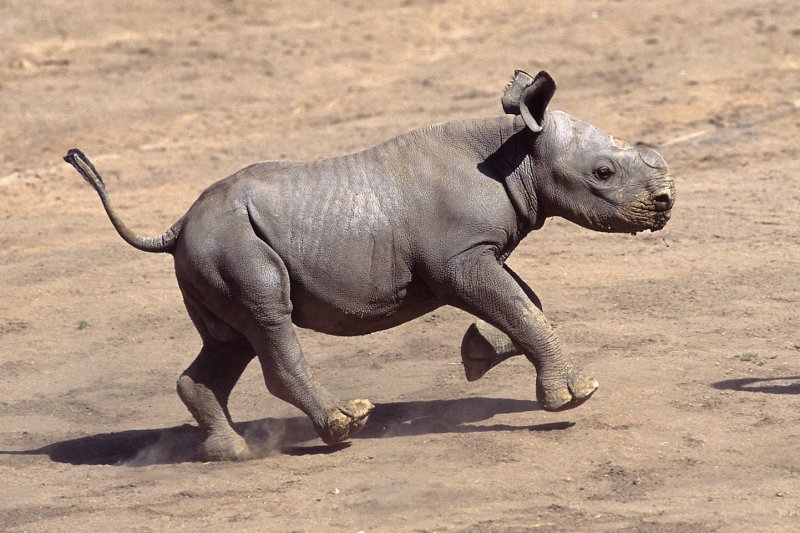A black rhinoceros calf gets some exercise at the San Diego Zoo's Wild Animal Park. The black rhino, native to Africa, is critically endangered. Photo by UPI/Ken Bohn/San Diego Zoo |
License Photo
Jan. 8 (UPI) -- Police, park rangers and other security personnel in South Africa are using DNA to link rhino poachers and confiscated evidence with the scene of the crime.
According to a new study published in the journal Current Biology, the Rhino DNA Index System, or RhODIS, is helping officials put rhino poachers and smugglers behind bars. The system has been used in 5,800 forensic cases.
"Unlike similar work in which genetic databases provide an indication of geographic provenance, RhODIS provides individual matches that, similar to human DNA profiling, is used as direct evidence in criminal court cases," Cindy Harper, a researcher in the Veterinary Genetics Laboratory at the University of Pretoria in South Africa, said in a news release.
After decades of declining poaching rates, rhino killings have been on the rise in recent years. In 2007, there were just 13 rhino poaching incidents. In 2014, there were 1,215.
The International Union for the Conservation of Nature lists the black rhino, Diceros bicornis, as endangered and the white rhino, Ceratotherium simum, as threatened.
Scientists compiled the DNA database by analyzing the gene variants among genetic samples collected from 3,085 white rhinoceros and 883 black rhinoceros. The database allows scientists to match DNA collected from confiscated horns or blood-stained evidence to a specific rhino with a high rate of success.
So far, successful DNA matches utilizing the database have been used nine times to prosecute, convict and sentence rhino poachers.
The genetic data can also be used to study rhino populations. A confiscated horn can be analyzed and traced back to a specific rhino population and geographic location. Park rangers can use the information to locate the rhino carcass.
Because rhino horns are often moved quickly from the scene of the crime to consumers across borders, researchers suggest more work must be done to make the database an international project. The coordination of enforcement authorities across national, state and local governments has helped the network grow and function effectively in South Africa.
"Thanks to this support, we've seen rapid growth of the database into a representative source of rhinoceros genetic data for both forensic and management applications from its inception," Harper said. "The unprecedented cooperation and support for the program from these authorities has been surprising and encouraging."















